
We had the pleasure of spending an afternoon discussing support groups with Elaine Payne, chair of Friends of Parkies based on the border of North Shropshire and South Clwyd. Elaine shares the significance of Parkinson’s support groups, what unfolds in these gatherings, and how to find them.
How did you get started? How did you start bringing people into the group, and is it more general discussions, or do you focus on specific topics?
Elaine: The group was already up and running when I was diagnosed. For two years after my diagnosis, I was absolutely in denial, in shock. It took me two years before a friend said, “Yes, you need to go along.” So, I did, and I just walked straight back out again. It wasn’t me. I was so scared; I walked out.
About six months later, I thought, “I’ve got to do something about this.” So, I went back, and gradually, found there were more ways to improve the group. Now, I’ve ended up as chairman, for my sins. The most important thing about the group is the chat, the talking. If people get to chat with each other, they can learn far more than when they go to see their doctor or neurologist once every six months to a year. Sitting and talking to somebody in the same situation, whether you have Parkinson’s or you’re the other half of the person, is crucial because they have a lot more to share. It’s a really important group for both people with the condition and those who look after them.
What usually happens at a meeting? What kinds of things do you talk about?
Elaine: We hold monthly meetings with 50-60 participants wearing name badges. Typically, we feature speakers such as artists, physiotherapists, pharmacists, Pilates instructors, and experts in singing and voice training. Last month, the pharmacist talked about their role in the community and what they can help us with. We try to make it light but informative to keep it interesting. Charco has visited us, as speakers twice now, which has been really good.
We try to make the talks Parkinson’s-related, but not always. You sit and chat in comfortable surroundings. It goes very quickly; we’re only there for two hours, and we get so much done. The most important part of the whole meeting is when people just sit and chat with each other. That’s the best part. Then, if someone doesn’t know something or wants to know something, there’s always somebody else who knows somebody.
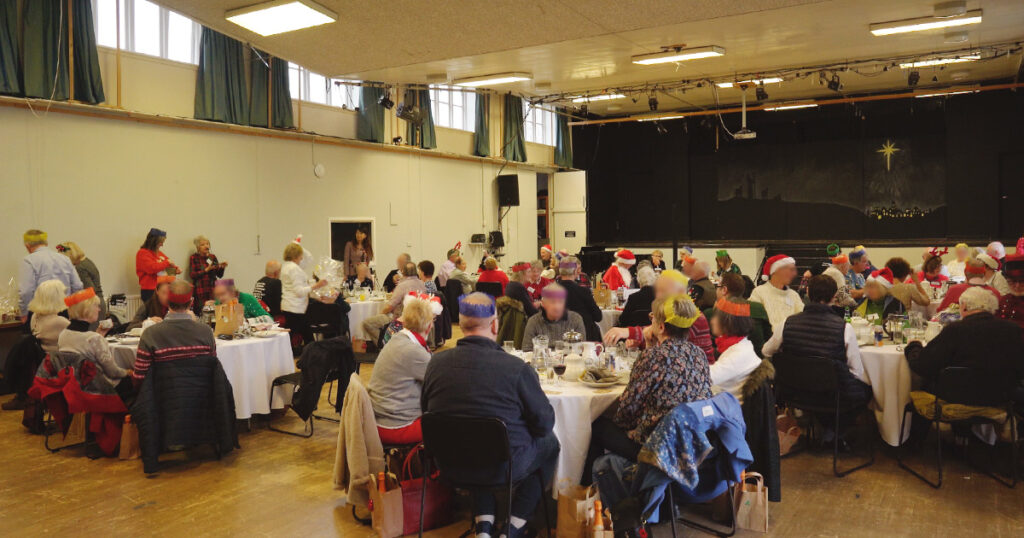
(Christmas Lunch Event, FOP, 2023)
What would you say to someone who might be hesitating, or reluctant to go to a support group?
Elaine: Unfortunately, what puts people off is that they might see things they don’t want to see, like I did the first time I went. You see some far worse than you are, much further down the line. You think, “Oh, I don’t want to see this.” But, as you all know, we are all so different in our Parkinson’s journey. So, that’s really important – that you have to accept that you might see things, but they’re not all bad, and you’ll find out far more and make good friends.
Well, you’ve got nothing to lose. Just go, just go once. If you hate it, start your own group. If you put out the call, be it on Facebook, or posters in the local supermarket, people will come along, and then you can start up your own ideas of how you would like it to look and what you would like to have.
For me, it’s given me my raison d’ȇtre – my reason to be. It’s given me so much. If you just go along and sit down, you might come out with an application for a blue badge or a personal independence payment (PIP) which you might never have known anything about. You might talk about DBS; you might talk about all these. There are things that your neurologist hasn’t got the time to talk to you about. You’ve got the time to sit down and chat to somebody who’s already been through it, and you’ll come out with so much more than you went in with. So, that’s the reason to go; you will get more out of it.
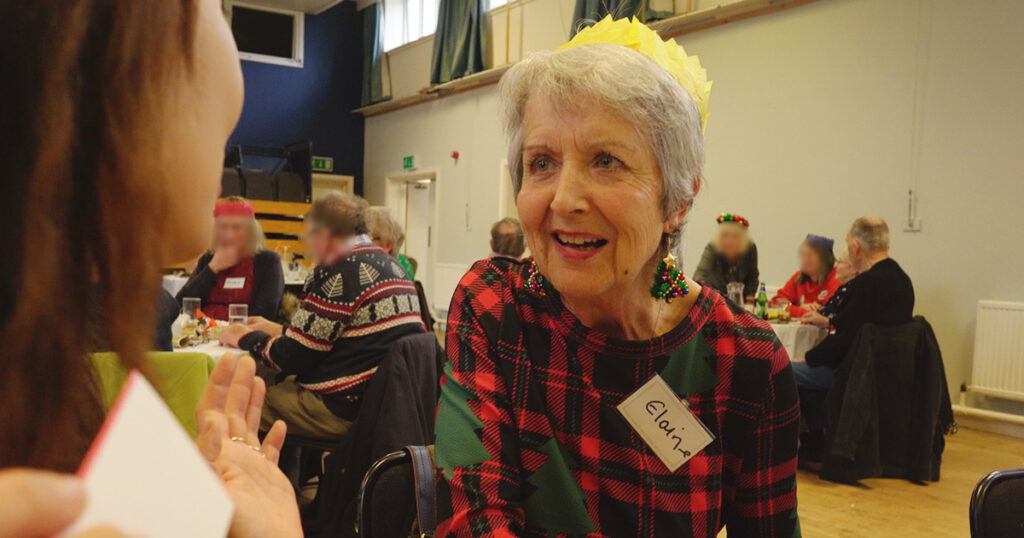
“I also have a life outside Parkinson’s which is fantastic but my main raison d’être is to make sure that people get the support that is available they just didn’t know about it”
Is there a story that you can share with us where you didn’t know about something that you were able to find out by joining the support group?
Elaine: I knew nothing after my diagnosis. My neurologist told me, “Mrs. Payne, you have Parkinson’s. We’ll see you in six months. Here’s some medication. Just to keep an eye on yourself.” I knew nothing about Parkinson’s UK, support groups, PIP, medication changes etc. In fact I knew absolutely nothing. I walked away, sat in my car, and I cried my eyes out. I went in for a sore arm and came out with Parkinson’s. So, I knew absolutely nothing. I went to the internet. Unfortunately, when you go on the internet, it’s not always good. You find out far worse things. So, what I did was slowly, gradually talk to people, and that is the best way to learn. So, I have gone along gradually, and the more I learn, the more I know that I don’t know, and the more I find out. There is so much available out there people don’t know about it. But when you get to a group, there are more people there to share what is available, so you will find out.
With your support group, is it mostly people who are diagnosed with Parkinson’s or can family members also join in?
Elaine: Absolutely, they’re going through the journey as well. It’s as important, if not more important, for them to have room and space at the meeting. So, we often put them in a separate room with a different speaker. Parkinson’s can become very boring if all you ever talk about is Parkinson’s. So, it gives them something else to talk about. What they do is that they will sit and chat to each other and they’ll find out more. As I say, while we’re all talking about medicines and consultants and moaning about this and that, the family members are talking about uplifting things that they can do instead. They’ll get together, do sponsored walks, and that sort of thing to raise funds for the group. So it’s really important for the other halves to be looked after because they’re the ones that do the driving, they’re the ones that do the unpaid care generally. We have our medication, we have our consultants, they have nobody. So, this way, they can now have somebody to talk to. They’re really, really important for family.
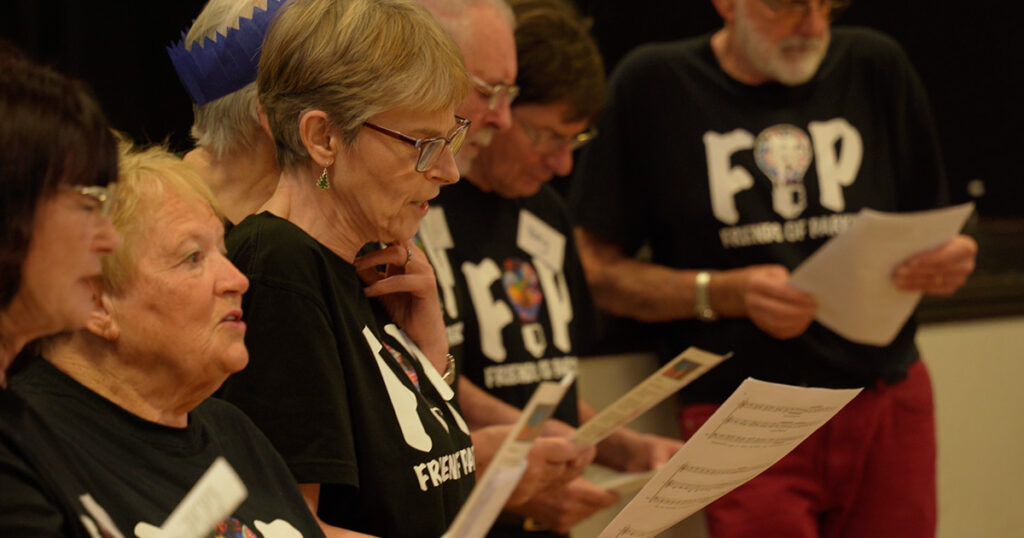
(Friends of Parkies Choir Singing Carols at the Christmas Lunch Event, 2023)
Can you tell us about a time when your support group had a really positive impact on a person with Parkinson’s?
Elaine: A couple of years ago, our group had a stall at a vintage car show, and we were selling raffle tickets for prizes. This lady came along, and she said, “Hey, can I have some tickets?” I said, “Yes, of course you can. Do you know anybody who’s got Parkinson’s?” She said “I was diagnosed just last week,” and I gave her a big hug. She said, “Just for somebody to say I’ve got it as well,” she said, “that made all the difference.” and she has been coming to our group since that day. So, for me, that’s what groups do. They make you feel as if you are part of something, not just going through it alone.
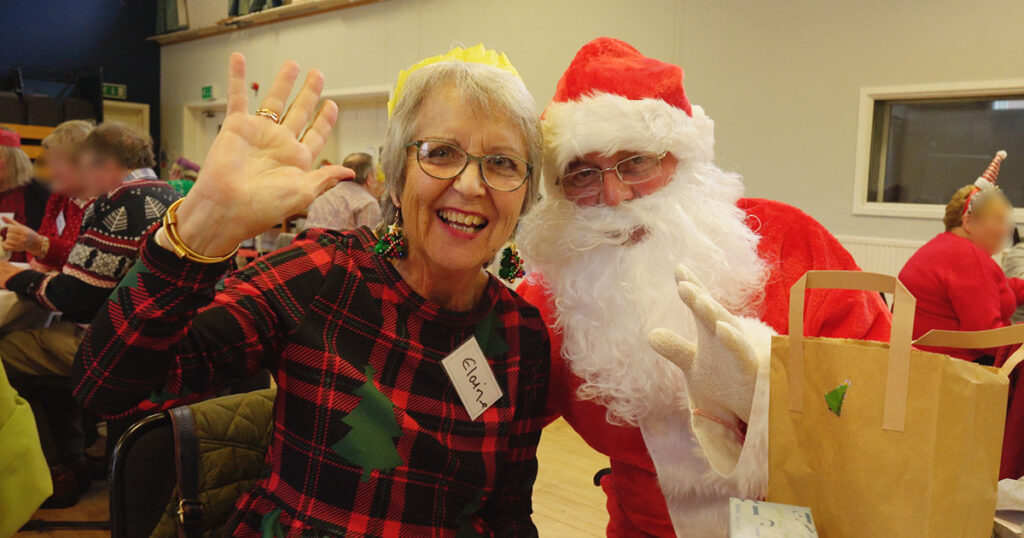
“If I can help somebody make life a little bit easier then I definitely will.”
Are there challenges of having a support group? What kind of things do you think can be helpful for the support groups to be more effective?
Elaine: Fundraising, information, and support— We make everything inclusive so people don’t have to pay to come along. We have a raffle ticket, people bring a raffle prize, and you can then choose to buy a raffle ticket or not. There’s no charge for coming to the group. We do fundraising towards our CUE1s, our lunches, our outings. The way to keep going is to have funds to pay for the rent for the hall and that sort of thing. We often receive offers from complete strangers. So, what we do is we challenge our members. We say, “Come on, 2024 is coming up. How are we going to keep going? Do we want to keep going? Yeah, we want to keep going. How do we keep going? Right, we’re going to have a sponsored walk.” The challenge for us is to keep the thing as interesting and as different as we can, and have speakers that are interesting to the people.
Where do you find the support group that is right for you? Do you think there is anything that we can do to help spread the word about support groups? How can people find them?
Elaine: I use Facebook every month. Every month I put, “Are you affected by Parkinson’s? Come along.” So, the thing to do is look on the internet. And if you’re not on the internet, go to your local supermarket, look on the notice board, and see if anybody’s putting posts up, which we do all the time. Ask your doctors because they’re supposed to know about all the social prescribing these days, and anybody should be able to go to them and ask, “I’ve been diagnosed with Parkinson’s or MS. What do you have for me?” So, local supermarkets, doctors, the internet, and Facebook.
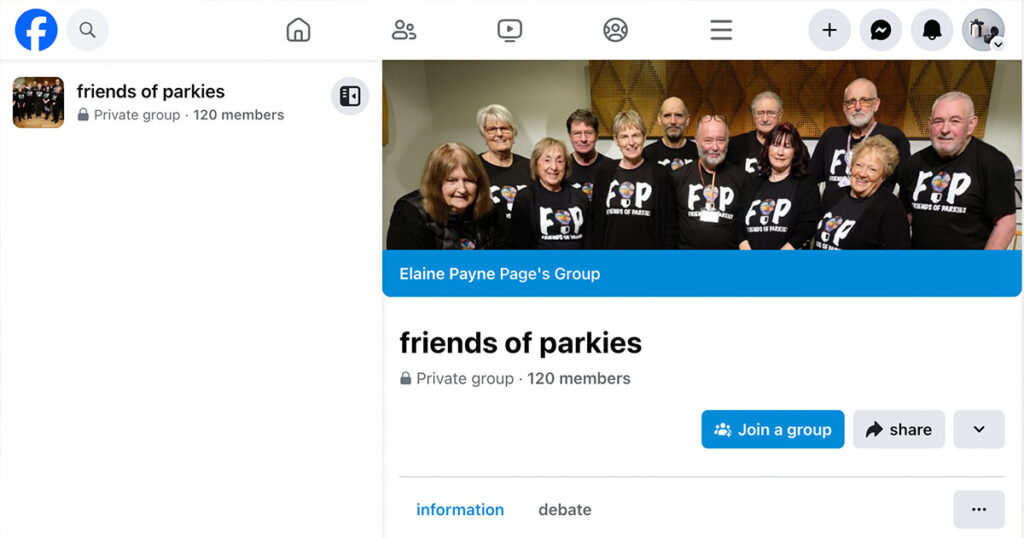
(Friends of Parkies Facebook Page)
Parkinson’s support groups are more than meetings; they are communities that empower with understanding, knowledge exchange, and strength.
As Elaine mentioned, you can find independent groups near you by visiting local supermarkets, doctors, the internet and Facebook. You can also find a Parkinson’s UK-associated groups near you at the following links :)
https://localsupport.parkinsons.org.uk/
https://www.parkinsons.org.uk/information-and-support/full-list-local-groups